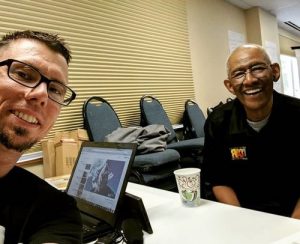Welcome to the final segment of this four-part series on recovery coaching. In the first segment, I shared how I discovered recovery coaching, and explained the basics of what it’s all about. In the second piece, we discussed healing centered engagement, and how incorporating the concept into recovery coaching helps facilitate healing. Then, we covered cultural humility and the role it plays in recovery communities. In this last article, I want to talk about two concepts that inextricably tie to personal, professional and community recovery development: Servant Leadership and Emotional Intelligence. Also, I have some great news about a new opportunity I’ll be embarking on with In The Rooms to provide Coaches and Peers a space to be supported and educated.
Servant Leadership
The term ‘Servant Leader’ was first coined by Robert Greenleaf in a 1970 essay, The Servant as Leader. In this essay, Greenleaf states that, “The servant-leader is servant first… It begins with the natural feeling that one wants to serve first. Then conscious choice brings one to aspire to lead.”
Servant Leadership in Action
I was first introduced to Servant Leadership and Emotional Intelligence (EQ) during my work with Goodwill NCW/Harmony Café around 2007. This idea is one that I work on truly embodying and practicing, as it deeply it resonates with my personal values. Working for an organization whose leaders modeled this philosophy was inspiring. I saw how people were treated when servant leadership was practiced and applied throughout an organization. Serving first meant addressing how programs impacted people’s lives and shaped the way we strategized our outcomes.
This philosophy particularly comes alive in the walls and spaces of Recovery Community Organizations (RCOs), who have direct access to influencing through this lens. Servant Leadership often times co-opts and feigns in organizations and advocacy movements.
What it Takes to Live It
Servant Leadership, like a lot of other buzz phrases, feels like the right thing to say. However, the strategy of simply saying it and writing about it doesn’t make it true or authentic. The people who mentored me through my recovery journey showed me how to live it and make it an embedded part of a culture. They provided me with tools, training and feedback that gave me the space to make mistakes, take responsibility and look deeper at my own personal and professional barriers. It’s not always easy, or for the faint of heart, or for individuals seeking a “feel-good” high. It is messy, difficult, demanding, and at times, ugly and painful. It requires a true detachment from personal or ego-based gain. Servant Leadership requires unrelenting integrity.
The difference manifests itself in the care taken by the servant-first leader to make sure that other people’s highest priority needs are being served.
Questions to Ask Ourselves
Here are the test questions we can ask ourselves from Greenleaf’s essay:
- Do those served grow as persons?
- Do they, while being served, become healthier, wiser, freer, more autonomous, more likely themselves to become servants?
- What is the effect on the least privileged in society?
- Will they benefit or at least not be further deprived?
As a Recovery Coach, or any person offering recovery support services, these are vital questions to ask ourselves. They are also great ways we can measure our fields’ effectiveness that doesn’t rely on “clean time” or “abstinence”, but rather addresses a person’s quality of life, community healing and bringing new leaders to the forefront.
In Tom Hills’ 2005 paper on Servant Leadership, Common Strength: Building Leaders, Transforming Recovery, he states:
Servant leadership is more than a “style” of leadership. As a way of engaging with the world, it suggests a radical alternative to the predominant forms of leadership commonly practiced today. It involves values and behaviors that include listening, empathy, healing, and humility.
This paper goes in depth about how the servant leader model is deeply embedded in 12-Step culture through the indoctrination of “service work” as a key component of one’s personal recovery. Greenleaf himself was a practicing Quaker and derived many of the elements of Servant Leadership from religious texts and teachings. His intent was to bring these values and principles to businesses in the for-profit and non-profit arenas. He did so as a consultant to notable institutions such as MIT, the American Foundation for Management Research, and Lilly Endowment, Inc.
Ten Characteristics
There are ten characteristics associated with Servant Leadership that also fit well into the realm of Recovery Coaching:
- Listening
- Empathy
- Healing
- Awareness
- Persuasion
- Conceptualization
- Foresight
- Stewardship
- Commitment to the growth of people
- Building community
These characteristics weave into many of the trainings and workshops geared toward the coaching field. As stated earlier, this calling is one of serving first. Coaches are of service to the people they walk with. We get to be the people who listen and allow them to build their pathway of recovery and support them in their process. We offer insight when asked, and provide a broader view of possibility and opportunity to help people achieve their goals. In order to maintain this commitment to being a servant and allowing others to be an expert of their own experience, we also have to look at our own emotional investment and responses to our recoverees’ decisions and to our world around us.
Servant leadership seeks to involve others in decision making, is strongly based in ethical and caring behavior, and enhances the growth of workers while improving the caring and quality of organizational life.
Emotional Intelligence
Emotional Intelligence, or EQ, is the process of recognizing and managing these attachments. EQ is the ability to handle one’s personal emotions and to recognize the emotions of others. It is an intelligence that many believe extends and outweighs the abilities of the IQ. EQ is not the opposite of intelligence; it is not the triumph of heart over head. It is the unique intersection of both.
Questions to Ask Ourselves
Some questions we can ask ourselves about our EQ in Recovery are:
- How did you learn to recognize or manage your emotions?
- What about learning to recognize what other people are feeling and going through?
- In your job, how are emotions dealt with?
- What kind of a relationship do you have with your emotions?
As people in recovery, and particularly, as Recovery Coaches, these questions can help us get a baseline idea of what to expect of ourselves when confronted with difficult situations with recoverees or clients. I learned how my responses to situations are not always grounded in the current moment. They may be a reaction from past traumas that something in front of me triggers or activates.
Taking Responsibility for Your Part in an Outcome
I recently attended the online Communities Project Leadership Training. In it, the facilitator, Michael King, invited the participants again and again to explore “taking responsibility for their part in an outcome”. This was challenging for me at first. What I thought I heard him say was that “I need to take full responsibility” for the outcome. My interpretation was a reaction to having been both the person who didn’t take responsibility for what was mine, and one who blamed others for not taking on what I thought was theirs.
It is a challenging concept, and one that asks for a new level of Emotional Intelligence and accountability. As a Recovery Coach and Trainer, I have to practice this over and over again. I know that I will make mistakes. Over the years, the length of time that I stay in a place without taking responsibility for my part has changed. I’ve learned to allow others to take on their responsibility in a way that works for them. It is no longer about feeling “justified,” but rather, knowing that I did what I know I needed to do. I’ve also seen this play out with coaches who become attached to the outcome of a recoverees “success” as a reflection of their own ability.
Emotions as Information
EQ requires mindfulness and a relationship with our emotions. This relationship is not one of pushing bad emotions away and clinging to good ones—there is a spectrum. In a lot of cases, due the complexity of being human, we may hold several emotions at once for the many things going on in our lives. Emotions are information. We get to pick up the internal phone to see what they are trying to tell us.
As someone who has struggled with depression while in recovery (such as today while fervently writing this) I know that it is a part of life. Today’s information, and the days leading up to now, tells me that there is a lot going on for me, personally and professionally. There is so much conflict, confusion, frustration and straight up rage in the air and that affects me. I had to look at my self-care and find a place of meeting myself where I was at.
The skill and life-long practice of expanding ones emotional intelligence and how we respond to our internal/external world is like the invitation we have in recovery to address our relationship with substances, family members and other escape routes. The more we build our relationship with our emotions, learn to understand them and work with them, the more we are able to serve others, lead in our communities and help people navigate the vast world of possibility in Recovery.
The Recovery Coach Connection

Lastly, I am excited to announce the start of a new meeting on In the Rooms called The Recovery Coach Connection. This will be a monthly meeting for Coaches and Peers to learn from others in the field, explore the art and role, and receive support. In each meeting, we will bring in a different guest to share their experience on topics relevant to the recovery coaching field and movement and answer your questions. There will also be an opportunity to bring any challenges or ideas to the group for support or feedback. Meetings will take place on the 2nd Monday of the month at 8:00 pm CST / 9:00 pm EST.
In Loving Memory of Art Woodard
 A true giant of the Recovery and Coaching movement, Art trained and touched thousands through his work as a SOULcial Worker and HELPer. He had a huge influence on me as a trainer. He was incredibly masterful and articulate in his stories, creative and relentlessly compassionate. I am grateful I was able to co-facilitate with him once and learn the ART first hand. Please hold space in your hearts for Art’s family and his CCAR family during this time.
A true giant of the Recovery and Coaching movement, Art trained and touched thousands through his work as a SOULcial Worker and HELPer. He had a huge influence on me as a trainer. He was incredibly masterful and articulate in his stories, creative and relentlessly compassionate. I am grateful I was able to co-facilitate with him once and learn the ART first hand. Please hold space in your hearts for Art’s family and his CCAR family during this time.





